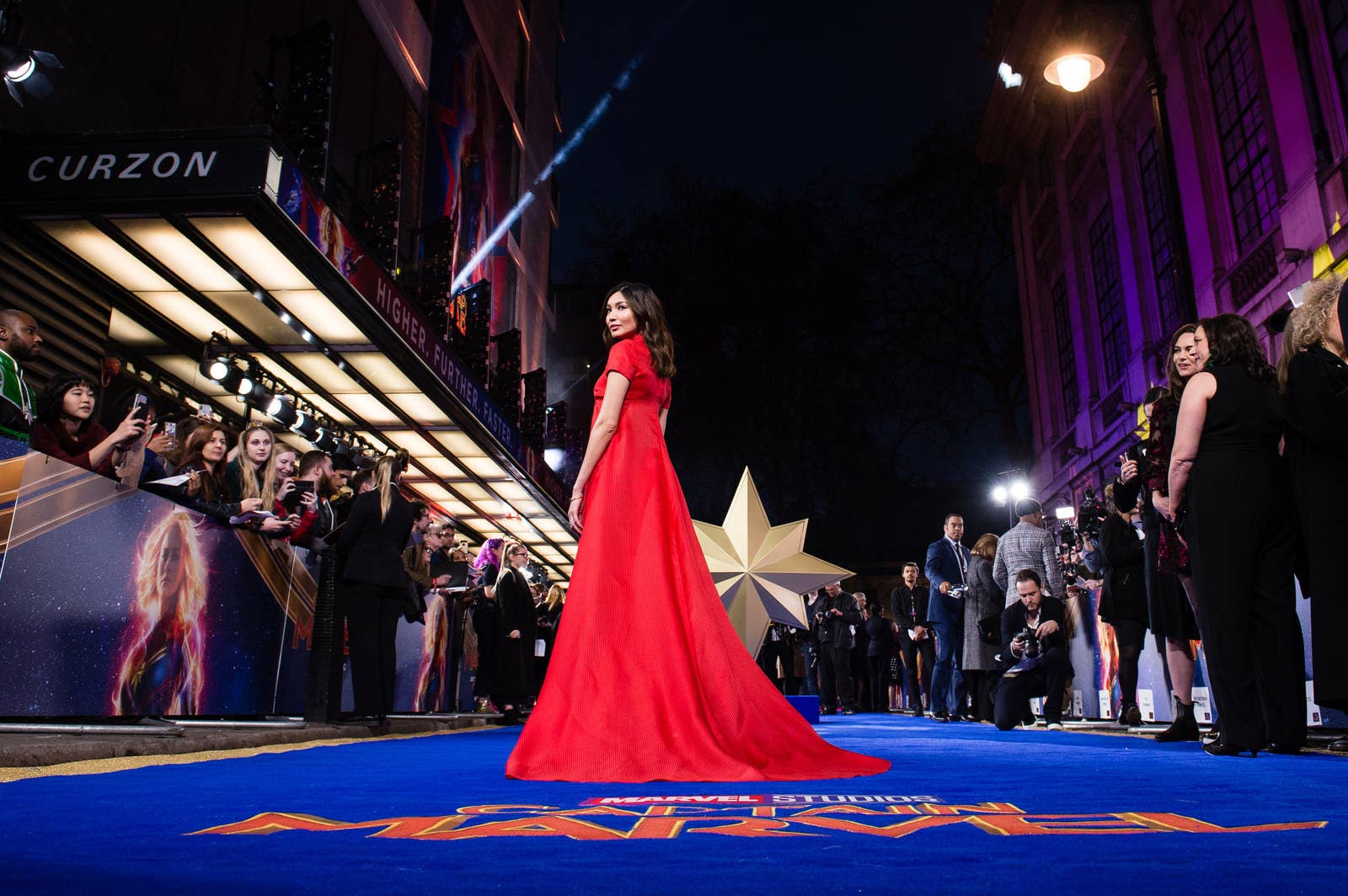
When Gemma Chan first auditioned for Captain Marvel, she encountered the vibranium-clad veil of secrecy that envelops every Marvel Studios movie. Not only did she have no idea what role she was trying out for, but the script she used for the audition was fake, a mock-up for prospective actors. After her second audition with another mock script, Chan finally got a chance to Skype with the film’s directors, Anna Boden and Ryan Fleck — but even then, she was kept in the dark.
“They pitched me the character, but they still didn’t tell me which character it was, or what her name was,” Chan told BuzzFeed News, during an interview at the Beverly Hilton in February. “They did say she is kind of an elite special forces member of an alien race,” she added with a laugh. “So that was a clue!”
It wasn’t until Marvel formally offered Chan the part that she learned she’d be playing Minn-Erva. In the comics, the character is a geneticist, but she was reimagined for Captain Marvel as a no-nonsense sharpshooter. More remarkable for Chan, Minn-Erva is Kree, a race of (mostly) blue-skinned aliens. The fact that Chan is Asian had no bearing on the part, or her casting.
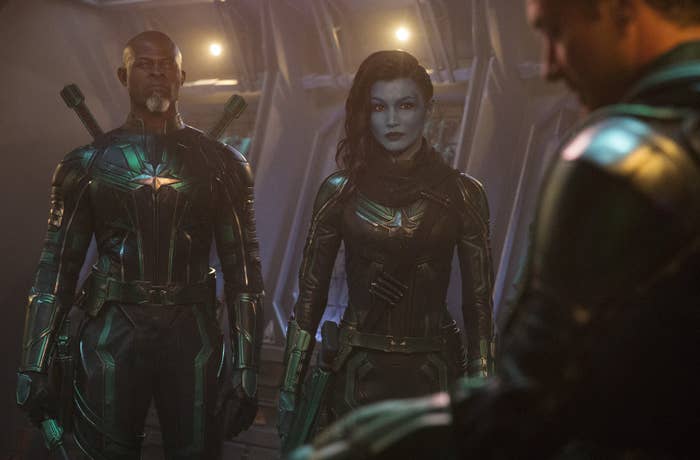
For practically its entire history, the entertainment industry has habitually cast white actors for characters whose race or ethnicity wasn’t specified, or even germane to the story, further winnowing the options for nonwhite actors to roles that often leaned hard on easy and pernicious stereotypes. The not-so-subtle message, both within the industry and in the culture at large, has been that whiteness is always the default.
That has not, however, been Chan’s experience.
“I think Riz Ahmed put it really well,” Chan said, referring to the 2016 essay by the British Pakistani actor and internet boyfriend. “There’s the three stages. Stage one is the parts you’re being offered are very stereotypical that are based on your ethnicity. Stage two is yes, your ethnicity is a factor, but it’s a part that challenges those stereotypes in some way. And then stage three, the holy grail, is your race doesn’t come into it, you’re just cast because they think you’re the best actor for the part.”
“I’m hopefully somewhere between two and three,” she added with a laugh.
Chan is being modest — she’s fully in stage three.
In December, she costarred in Mary, Queen of Scots as the 16th-century English noblewoman Bess of Hardwick, opposite Saoirse Ronan and Margot Robbie, and last month, it was announced Chan will costar with Freida Pinto in the Jane Austen–style period romantic comedy Mr. Malcolm’s List — both roles that heretofore would have only been played by white women. And with Captain Marvel, Chan joins several nonwhite actors — Idris Elba, Zoe Saldana, Tessa Thompson — who’ve landed roles in the Marvel Cinematic Universe that were either drawn in the comics as white or had no specified (Earthling) race or ethnicity.
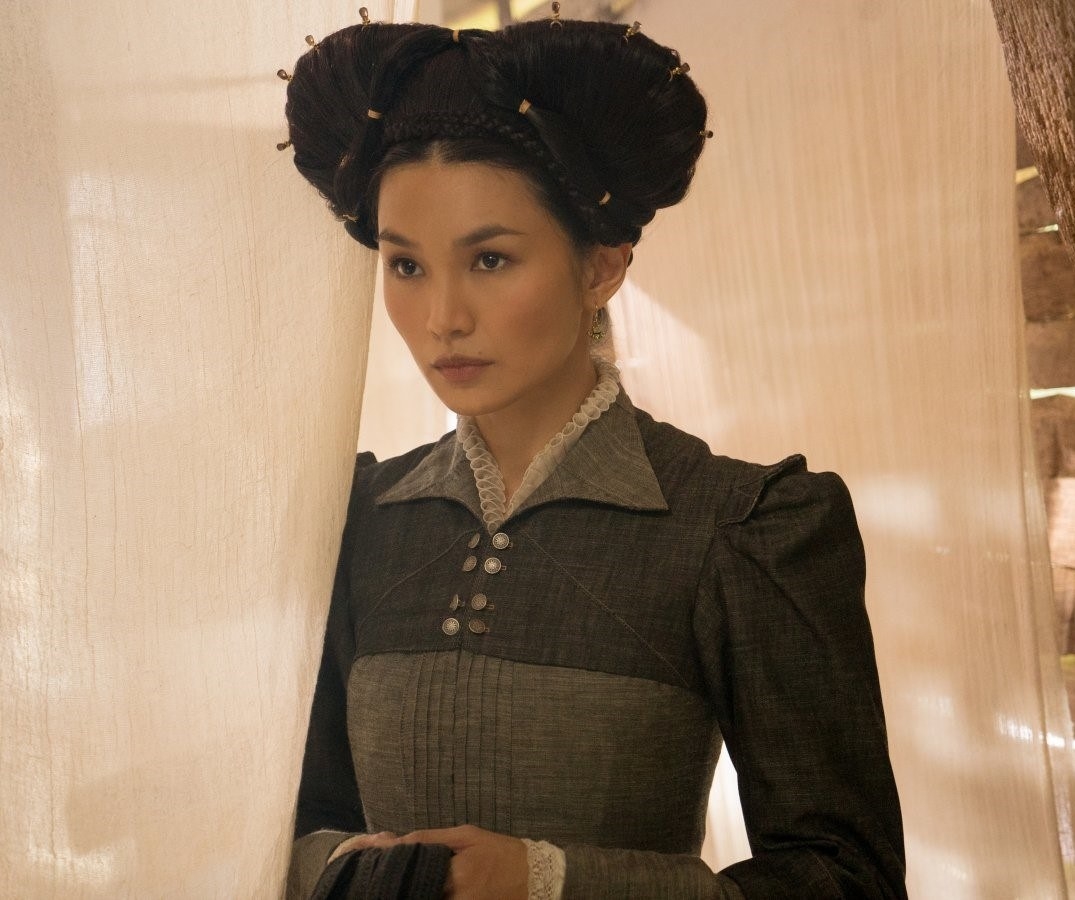
Along with her breakthrough performance last summer as Astrid in Crazy Rich Asians — the first feature film from a major studio with an all-Asian cast in 25 years — Chan has found herself at the forefront of a long overdue shift in how Hollywood treats diversity and representation. And she can’t help but, yes, marvel at how quickly it has hit her industry.
“I graduated from drama school 10 years ago, and the landscape 10 years ago — five years ago — compared to now is really different,” she said. “I would never have thought that Crazy Rich Asians would get made, that I would be cast in a period [British] drama. I hoped it would get to that point, but if I’d said that was going to happen 10 years ago, I probably would’ve been laughed at.”
She’s not speaking in the abstract. While Chan is currently enjoying a breadth and wealth of opportunities few if any women Asian actors have ever experienced, getting to that point has been far from simple.
Chan grew up as “one of the very few Asian faces” in a small town outside of London. The daughter of parents who had emigrated from Hong Kong, Chan tried as a kid just to fit in. “And then there’d be someone saying, ‘Your English is so good,’ or something like that. And you’d be reminded that you don’t look like most of the other people around you.”
When Chan told her parents that she was leaving her just-earned law degree behind to enroll in the prestigious Drama Center London and pursue an acting career, they did not take the news well. When asked about how it informed her career, she grimaced, having discussed the topic in prior interviews.
“I feel a bit bad when this comes up, because I know how proud they are of me,” Chan said. “And I also completely understand the reaction that they initially had. It was one of fear and worry for their daughter.”
Her parents understood that, if their lifetime of experience with Asian representation in film and TV was anything to go by, the best Chan could hope for was a career filled with a meager selection of roles stuck in Ahmed’s stage one — steeped in stereotypes with little agency or depth. And initially, that is what Chan encountered.
“I’d do [the audition], they’d kind of whisper, they’d come back: ‘You sound a bit too British. Can you do a bit more of an accent?’”
“You would get casting breakdowns, and it would say, ‘We’re only casting Caucasian people for this,’” she said. “There were times [Asian] ethnicity would be specified. And you’d think, Oh great, they are looking for a Chinese actress or an Asian actress. And I’d do [the audition], they’d kind of whisper, they’d come back: ‘You sound a bit too British. Can you do a bit more of an accent?’”
Chan encountered this kind of thinking in her first major breakout role for Sherlock, the international sensation starring Benedict Cumberbatch as a modern-day Sherlock Holmes, and Martin Freeman as his put-upon friend and partner, John Watson. For the 2010 episode “The Blind Banker,” Chan was cast as a Chinese immigrant named Soo Lin Yao, who moved to London to escape a Chinese criminal syndicate named the Black Lotus. The episode was criticized for indulging in “nearly every hackneyed orientalist cliché going,” and it’s widely regarded as one of the worst in the series, largely for that very reason.
It was also an enormous opportunity for Chan, and certainly a helpful springboard for much of her subsequent success. So discussing her feelings about the episode now, from the vantage point of a post–Crazy Rich Asians industry, is a complicated prospect for her.
“That’s what they wanted,” she said about her character’s noticeable accent, her typically rapid speaking style slowing to a careful crawl. “Not to be disparaging in any way about anyone involved with that show — I had a really great experience. Of course, I was going to jump at the opportunity to work with Benedict and Martin.”
Then she stopped herself for a moment.
“Oh, I don’t know if I should go down that route,” she said quietly to herself, before pressing on a bit further.
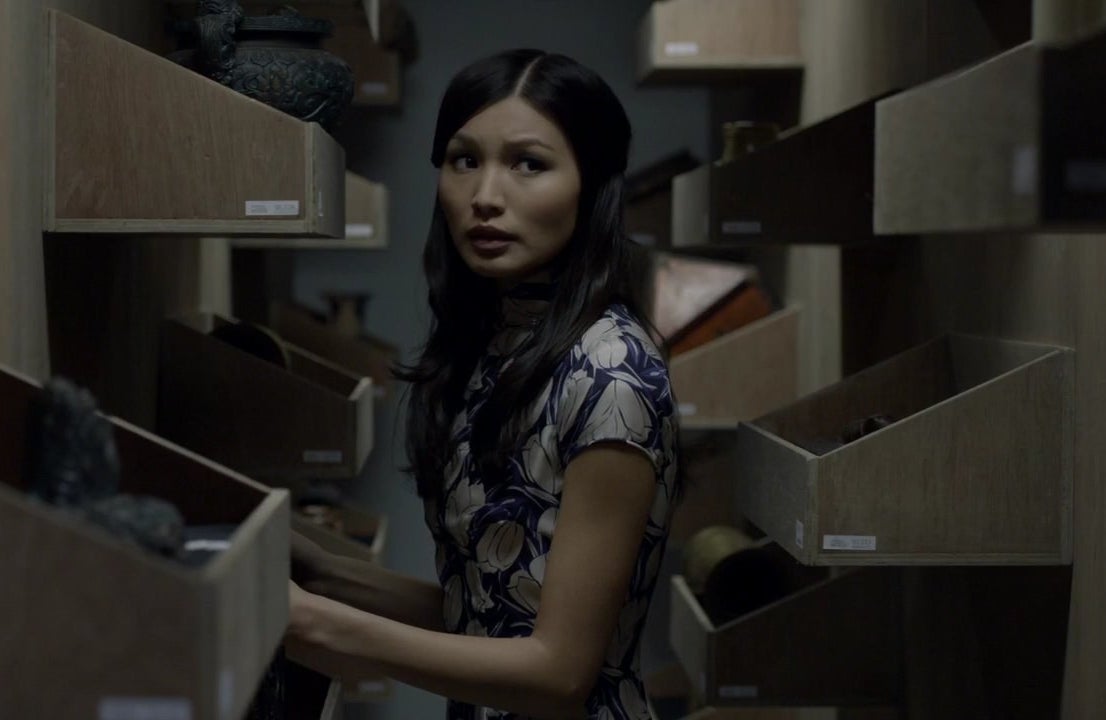
“I know there were things about that particular episode which the Asian community may take issue with,” she said. “There are certain orientalist tropes which, now, I can see, and perhaps I would think twice about what is this [episode], you know, saying. I had bills to pay, and I was so grateful to work. … But, yeah. Would I — would I have necessarily played that part? I don’t know! It’s hard to say.”
Chan first began to grasp that the arc of her career might change three years later, when she booked a role on Shetland, a BBC crime drama set in Scotland. She was surprised that her part wasn’t written for an Asian actor.
“I read the book that it’s based on. This character Hattie — she’s Scottish, [and] it’s not mentioned, but you assume she’s white,” she said. “Somewhere down the line, someone said, ‘We’re opening this up.’ … That part meant so much to me, because it wasn’t to do with my ethnicity.”
It happened again when Chan was cast in 2015 on the sci-fi series Humans as an android with no specified ethnicity, and in 2017’s Transformers: The Last Knight as Quintessa, a largely motion-capture role best described as a villainous humanoid Cybertronian. But even with this success, when Chan was asked to audition for Captain Marvel, she couldn’t quite believe there was a part for someone who looked like her.
“I remember reading scripts just thinking, Oh, I couldn’t possibly play the lead. Maybe they’ll consider me for the secondary part or the supporting part.”
“I didn’t think that they would necessarily want me to be in it,” Chan said. “I think it’s something I have to work on and challenge within myself. I think you internalize a lot of that, in various different ways. Whether we’re talking about possible parts, but even just believing whatever it is. That’s why representation is so important, to challenge your own ideas about what you think you can do.”
Chan recalled a conversation with a director friend of hers who’s also British and of Asian descent.
“He said he’s had to train himself, when he reads a script, not to automatically assume that the lead character is white,” she said. “That’s something that he’s internalized just from the films that he watched growing up. I have to do that as well. I remember reading scripts just thinking, Oh, I couldn’t possibly play the lead. Maybe they’ll consider me for the secondary part or the supporting part. I just assumed that there’s just no way I’d be considered.”
Ironically, it’s been the experience of making Crazy Rich Asians — a film that celebrates her ethnicity right there in the title, rather than set it aside as immaterial — that has helped Chan begin to change her perspective on what’s truly possible for her career.
For one, as she and her castmates made the rounds of Hollywood events and parties during awards season, she experienced firsthand just how many people within the industry responded to the film, and to her character in particular.
“Everyone has been so effusive,” she said. “They mainly want to talk about how much they or their sister, their brother, their son, their daughter, their grandparent really loved this film. People really responded to Astrid. I lost count of how many times people would say, ‘She was my favorite character.’ I think people really related to this woman who had to sacrifice a bit of herself and take a second seat to her husband, and then reclaims her power.”
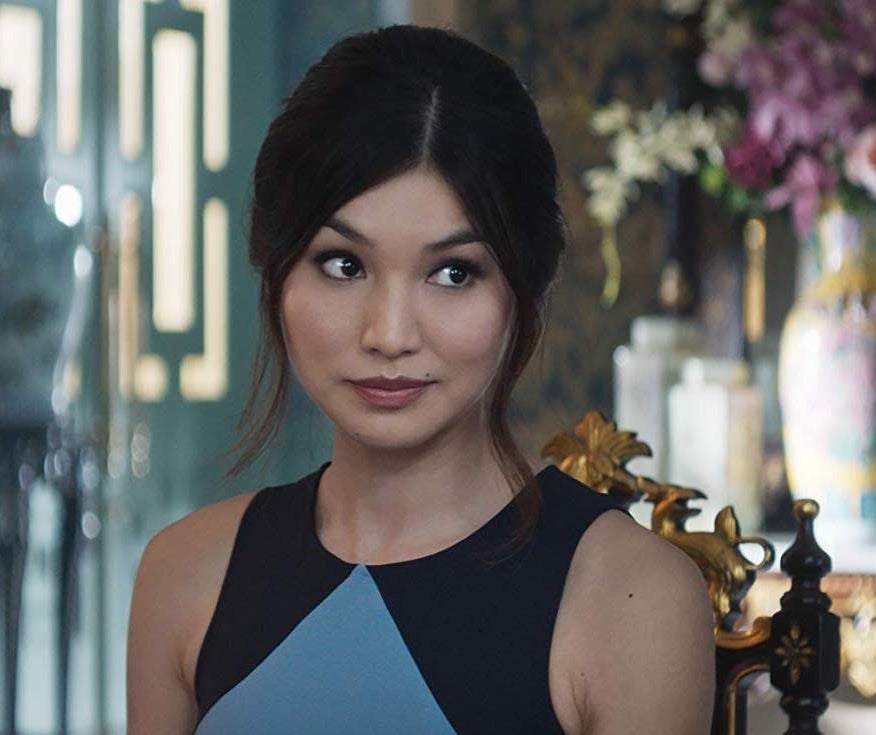
For another, making a film that is boldly, unabashedly aspirational — in wealth, beauty, and power — provided Chan the kind of representation she needed herself.
“Showing Asians being successful — having Asian men being incredibly attractive and sexy, funny but not the butt of the joke — reclaiming that and saying, ‘This is who we can be’ … It’s meant so much to me personally,” she said.
Since Crazy Rich Asians, Chan has indeed been fielding more offers. “Some unhappy wife parts,” she said with a laugh, “which I know is slightly inevitable. Some more interesting than others. I’m not getting offered everything, I don’t expect that. But it does feel like there are more possibilities now, that I will be at least in the conversation for certain projects, so that’s exciting.”
What Chan absolutely wants to avoid, however, is the idea that she’s the only one charting this path in Hollywood. “It’s not that no one else could have done it, but that I’m fortunate enough that I’m working now in this time when these films are being made,” she said. “I don’t want to be the only [one]. Hopefully a rising tide lifts all boats, and I think there is so much Asian talent out there. And I want to be just one of many people doing well.”
She is unabashedly enjoying one perk of her fame: She brought her parents to the London premiere of Captain Marvel.
“I try to include them as much as I can now with everything,” she said. “They love it. They’re enjoying it now. I remember saying to my parents, ‘I get how tough it can potentially be, and I may well fail. But I would like to be part of a change.’ I didn’t quite know how I was going to get to that point. But I am really happy that now I am.” ●
